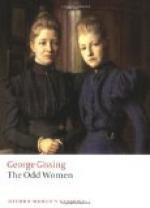‘Out of the question for me to leave the house,’ he said, meeting her eyes and smiling. ‘You won’t be hard upon a starving man?’
At once Rhoda made a pretence of having felt no hesitation.
‘Oh, of course we will dine immediately.’ She rang the bell. ’Miss Barfoot took it for granted that I would represent her. Look, the fog is penetrating even to our fireside.’
‘Cheerful, very. What is Mary doing at Faversham?’
’Some one she has been corresponding with for some time begged her to go down and give an address to a number of ladies on—a certain subject.’
‘Ah! Mary is on the way to become a celebrity.’
‘Quite against her will, as you know.’
They went to dinner, and Barfoot, thoroughly enjoying the abnormal state of things, continued to talk of his cousin.
’It seems to me that she can’t logically refuse to put herself forward. Work of her kind can’t be done in a corner. It isn’t a case of “Oh teach the orphan girl to sew."’
‘I have used the same argument to her,’ said Rhoda.
Her place at the head of the table had its full effect upon Everard’s imagination. Why should he hold by a resolve of which he did not absolutely approve the motive? Why not ask her simply to be his wife, and so remove one element of difficulty from his pursuit? True, he was wretchedly poor. Marrying on such an income, he would at once find his freedom restricted in every direction. But then, more likely than not, Rhoda had determined against marriage, and of him, especially, never thought for a moment as a possible husband. Well, that was what he wanted to ascertain.
They conversed naturally enough till the meal was over. Then their embarrassment revived, but this time it was Rhoda who took the initiative.
‘Shall I leave you to your meditations?’ she asked, moving a few inches from the table.
’I should much prefer your society, if you will grant it me for a little longer.’
Without speaking, she rose and led the way to the drawingroom. There, sitting at a formal distance from each other, they talked— of the fog. Would Miss Barfoot be able to get back at all?
‘A propos,’ said Everard, ’did you ever read “The City of Dreadful Night"?’
‘Yes, I have read it.’
‘Without sympathy, of course?’
‘Why “of course”? Do I seem to you a shallow optimist?’
’No. A vigorous and rational optimist—such as I myself aim at being.’
’Do you? But optimism of that kind must be proved by some effort on behalf of society.’
’Precisely the effort I am making. If a man works at developing and fortifying the best things in his own character, he is surely doing society a service.’
She smiled sceptically.
‘Yes, no doubt. But how do you develop and fortify yourself?’
She was meeting him half-way, thought Everard. Foreseeing the inevitable, she wished to have it over and done with. Or else—




